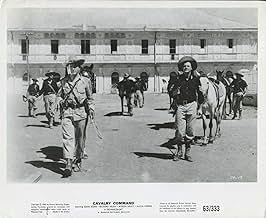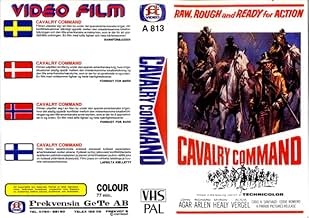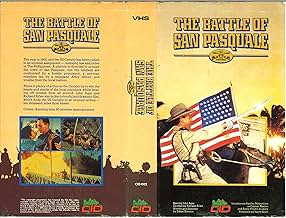An American cavalry brigade is sent to occupy a small Filipino village in 1902 and quell guerilla resistance in the surrounding jungle. Working with the people to build roads, schools, and b... Read allAn American cavalry brigade is sent to occupy a small Filipino village in 1902 and quell guerilla resistance in the surrounding jungle. Working with the people to build roads, schools, and bridges, they prove that the most important thing an army can have is "good will and integr... Read allAn American cavalry brigade is sent to occupy a small Filipino village in 1902 and quell guerilla resistance in the surrounding jungle. Working with the people to build roads, schools, and bridges, they prove that the most important thing an army can have is "good will and integrity."
- Pvt. Scanlon
- (uncredited)
- Directors
- Writer
- All cast & crew
- Production, box office & more at IMDbPro
Featured reviews
As an action or war movie it fails. There's about 3 minute of action total, including one ridiculous fistfight where the American officer outweighs a Filipino leader by 50 lbs and still barely wins.
The war depicted was one of the most brutal, but almost unknown in America. Up to a million dead, massacres, forced relocation, starvation, epidemics, and several notorious generals who issued orders to "kill everyone over 10 years old."
And this film whiteswashes it, makes the troops into nice guys who build a well and a school. The patriots who fought for independence for over 30 years are shown as primitive savages (with feather headdresses!) or deluded. And the average Filipino just loves loves loves Americans, the exact opposite of real history.
So I am surprised that Eddie Romero, a Filipino who should know his own country's history, is the director of this film, a prime example of inaccurate history and bad film making as well.
This film is in no way an accurate depiction of the interaction between Americans and Filipinos at the time shown. And I would hate to believe that it would be received as such.
Before anyone is offended by my review, let me state first that it is historically inaccurate.
Unlike the conditions depicted in this film, the United States was a far worse occupier of the Philippines at this time than the Spanish before them The Spanish at least came to recognize the national aspirations of the Filipinos to some degree. The U.S. Army, however, considered the Filipinos subhuman and raped the women and killed the men without remorse. Ask me to verify this. I can.
No surprise, then, that there was a popular insurrection against the American occupation. The racist attitude of the Americans never completely went away, but eventually a peace of sorts came to be and improved dramatically over time. By World War II, the Filipinos were with us against the Japanese, who were the most brutal occupiers in modern history.
But 40 years earlier, in 1902, the American Army was still indiscriminately slaughtering people who wanted their freedom and their own nation. To help rule the Philippines, the Americans set up an elite class of quislings as the ruling class, a pragmatic mistake that haunts the Philippines to this day and is responsible for their systemic inability to rule themselves effectively.
Before this seems like a condemnation of the United States, let me note the following: The United States had promised before World War 2 to grant the Phillipines their independence in 1946 and, unlike other Western powers, who were interested in holding on to their colonies, the United States did exactly that on July 4, 1946--less than a year after the end of the war-- much to their everlasting credit.
This review was deleted once before because someone was offended by it, which is not the best of reasons. If IMDb has a problem with this review, I ask them to contact me before deleting my review. I am not speaking out of the wrong end, and I can prove it.
Did you know
- TriviaThis was director Eddie Romero's first English-language film for international release. With Cirio H. Santiago of Premiere-People's Pictures and long-time collaborator Gerardo de Leon, he co-produced and directed this film, a period movie set in the early days of the American occupation of the Philippines. The American cast included John Agar, Richard Arlen, William Phipps and Myron Healey. The Filipino cast had Pancho Magalona, Alicia Vergel, Eddie Infante, Cielito, Boy Planas, Vic Diaz and Max Alvarado. At the Fifth Asian Festival held in Manila in April 1958, Boy Planas--who played the brother of Magno Maxalla (Pancho Magalona)--won the Best Child Actor award. The movie made its theatrical debut in the US in 1963 as "Cavalry Command" and was later released in home video with the same title. Alicia Vergel had a kissing scene with star John Agar. Her reaction: "It was my first movie kiss and I certainly hoped it was my last. I was so nervous that I didn't feel anything. [Producer] Cirio Santiago and [director] Eddie Romero were mad at me when we were shooting scenes in Vigan because I didn't like to do the kissing scene. It was only when we were back in Manila that I consented to go into the clinch". Vergel did the kissing sequence after viewing the first rushes of the picture; she suddenly realized that the picture would be dull in America without it. "Besides", she said, "I don't want it said Filipinos don't know how to kiss. But I insisted on only take, Agar commented he liked the kiss so much that he wanted one more take. But I lifted my Maria Clara dress and ran like the dickens, bawling all the while. Later, John teased me: 'I feel insulted. You are my first leading lady I kissed who cried'."
Details
- Runtime
- 1h 17m(77 min)
- Sound mix
- Aspect ratio
- 1.37 : 1











